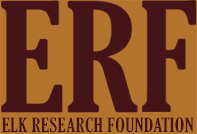

|
Project 1604 - Chronic Wasting Disease Statistics Study Suggest States Do Not Sufficiently Test Free-Ranging HerdsHOWARD LAKE, MN- A new study reviewing Chronic Wasting Disease sampling reveals possible gaps in understanding where the disease exists across North America. The Elk Research Foundation (also known as the Elk Research Council) announced it is working to gain a better understanding on Chronic Wasting Disease sampling data performed in free-ranging and farmed deer herds.The Elk Research Foundation (ERF) works to learn more about diseases that impact North American elk. Chronic Wasting Disease is a transmitted prion disease of cervids impacting North American elk, moose and certain species of deer. Most state wildlife agencies have some type of Chronic Wasting Disease sampling program using hunter-harvested deer, road kills or a combination of the two. Farmed deer and elk herds participate in Chronic Wasting Disease herd monitoring programs that require owners to test every animal over twelve months that dies at the owner's expense. All American states and Canadian provinces require farmed herds to participate in the program for at least five years in order to transport animals interstate. The Elk Research Foundation, the Wisconsin Cervid Farmers Foundation, Exotic Wildlife Association and Texas Deer Association posed several questions to statisticians tasked to review data supplied by state wildlife and state agriculture agencies via open record acts. The study reviews states that have a large number of farmed deer and elk herds with no known evidence of Chronic Wasting Disease in the state at all- in either farmed or free-ranging herds. Analyzing the data submitted by state governments, if Chronic Wasting Disease exists in a state or county but has not been detected, it is highly probable that the disease will be discovered in the farmed cervid population first because of the sheer greater number of samples collected and tested. As an example, Indiana is a state with no known presence of the disease; based on the states' 2012 data, if Chronic Wasting Disease existed at an equally low prevalence in both the farmed and wild cervid populations, it is 89% more likely it will be found on a deer ranch first. There is only a 3% probability of discovering disease only in the free-ranging deer herd first. Minnesota's data shows large gaps in testing levels between farmed deer and free-ranging deer herds. In 2014, agency reports claim there was 10,361 farmed cervids (deer and elk) that existed in the state and 1,729 were tested for Chronic Wasting Disease. This equates to 16.69% of the total farmed deer population tested for the disease. In contrast, the state estimated there was 644,453 free-ranging deer with only 516 tested, equating to 0.080% of the state's herd tested for the disease. In addition, only 17 out of 130 Deer Permit Areas had any testing surveillance at all. The study also reviews the risk of interstate transport of wild elk being captured and released for translocation projects. Many states are considering restoration of wild elk herds using Kentucky as the source state. Using data supplied by Kentucky's government, the statistician determined the statistical confidence level of CWD sampling of Kentucky's wild elk herd that is often relocated to other states for elk restoration projects. In recent years, transports have been made to Missouri and Wisconsin. Based on Kentucky's wild elk herd population that resides in 16 counties, the sampling rate for the wild elk herd is a 95-3 confidence prevalence rate. A 2016 guidance document for this type of movement published by United States Department of Agriculture's Animal and Plant Health Inspection Service requires cumulative sampling for the most recent 3-year period to be a 95-1 confidence prevalence rate. Kentucky's sampling falls short of the 95-1. Link to Elk Research Foundation Project 1604 Report Link to Elk Research Foundation Project 1604 Report - Appendix II (Minnesota) |
| Copyright © 2024 Elk Research Foundation. All Rights Reserved. |